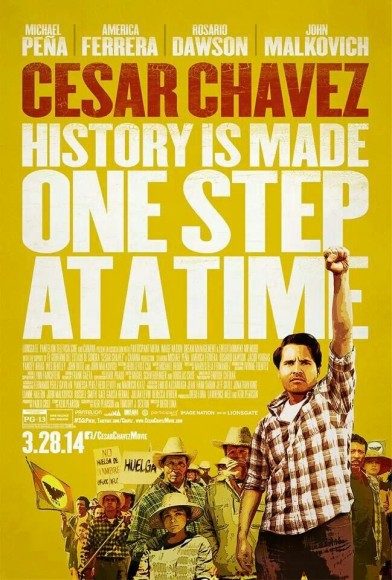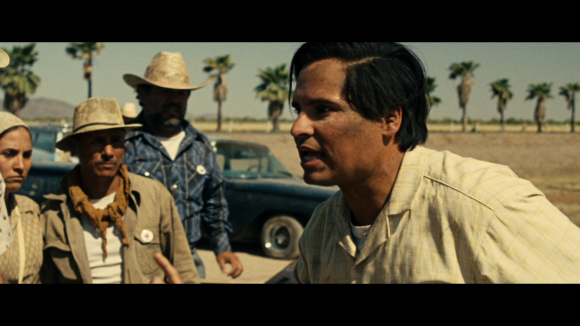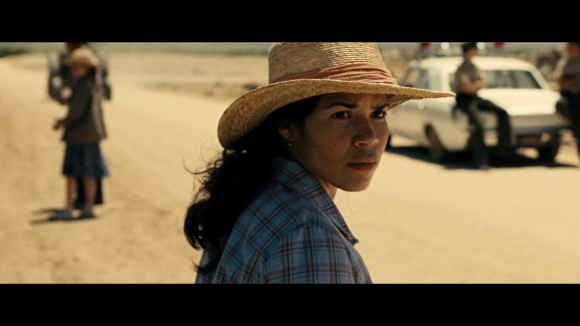Diego Luna’s Cesar Chavez is a good film about a great man. Unfortunately, it’s not a great film. Not in the way similar films about great men are – e.g. Spike Lee’s Malcolm X; Steven Spielberg’s Lincoln.
The film depicts Chavez’s struggles to improve working conditions for migrant workers in California. Quite a few events are covered, including the founding of the United Farm Workers labor union, massive boycotts of the grape industry, the support the cause receives from Robert Kennedy, and subsequent undermining by Richard Nixon. It’s a lot to cover, which is one of the film’s weaknesses. The UFW’s formation, the organization of Mexican American workers, and Chavez’s attempts to guide the cause – allying with Filipino workers; keeping the protests nonviolent – are all well handled. Mixing the film’s footage with old newsreels really goes a long way to show how inhumane white human beings can be. Unfortunately, I can’t say adequate attention was given to other events.
Consider Chavez’s 25 day fast in defiance of the violent actions members of the UFW were taking. The process of fasting – the toll it takes on the human body and mind – is interesting subject matter, and could have been the film’s centerpiece – I even recall it being promoted as such in one of the film’s trailers. Instead, Chavez utilizes the fast as a drawn out climax. Another fascinating event, Chavez’s sojourn to Great Britain, feels glossed over. When the grape growers began importing to Europe to circumvent the successful boycott of their product, Chavez seeks aid from British unions. The contrast between American and more progressive British union laws was another potential center piece. Here, it’s wasted as padding for the third act.
In terms of performance, I really can’t find any fault. The issue is with the way the characters are drawn in the script, penned by Keir Pearson (Hotel Rwanda) and Timothy J. Sexton (Children of Men). I admit when I first heard it would be Michael Pena manning the Chavez role, I was a little confused. I was mostly familiar with his minor comedic roles (such as a psychotic, effeminate, drug using, mall cop in Observe and Report). Luckily my limited knowledge of his filmogrophy had no bearing on his turn as Chavez. Pena’s Cesar Chavez is kind, compassionate, personable…and not much else. The writers’ goal may have been to humanize Chavez, to make him relatable, but they didn’t make him anything beyond a nice human being. Admittedly, as a native Southern Californian I know far less about Chavez than I should, so as far as I know, this is a one hundred percent accurate portrait of the man. Yet, I have to believe that someone who could rally people together to the extent that Chavez did (and does on screen) must have been exceptional, and charismatic, not just nice. The Chavez we get is a decent man, but it’s difficult to understand how he kept his often unstable union from collapsing before him.
One of the more interesting characters is John Malkovich’s Bogdonavitch, who serves as the main antagonist. While the film has plenty of the typical loud racist white men, Bogdonavitch is a little different. An immigrant himself, Bogdonavitch built his grape empire with hard work, and sees the laborers’ demands as lazy and ungrateful. It’s nice to see a different attitude than the common “[insert minorities] are evil” you commonly get from antagonists in films like this. It doesn’t make the guy sympathetic, just a little more complex. He serves as great foil to Chavez – although the two don’t meet until the very end of the film.
The biggest writing issue with Cesar Chavez is how it handles Chavez’s family. Cesar clashes with his oldest son (one of eight children) over the strain his work puts on the family. This isn’t a bad approach to take – again, humanizing – but it’s painfully ham-fisted and predictable. From their first argument to the inevitable grudging reconciliation, anyone could predict the arc of their relationship. What’s worse is we already see plenty of Cesar’s family dynamics through his wife (America Ferrera doing the best she can with the material). Ferrera conveys so much more with an expression or a quick line than any emotional throw down between father and son.
The Verdict: 3 out of 5
The treatment of immigrants (legal and otherwise) who break their backs so we can live comfortably is as relevant as ever today. The issues Cesar Chavez covers are important and need to be discussed; I just can’t say the same about the film. Some good performances and competent direction elevate a by-the-numbers script above mediocrity. Just above, though.



